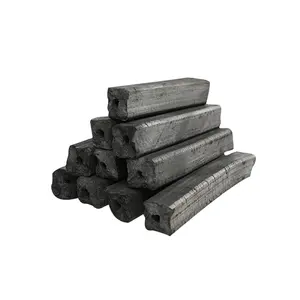
FireMax High Quality Long Time Burning Bamboo Sawdust Charcoal Sticks Barbecue Charcoal 95% Hardness



















In an era where sustainability is not just a choice but a necessity, the discovery of bamboo charcoal emerges as a beacon of innovation in eco-friendly manufacturing. This remarkable material, derived from one of the fastest-growing plants on the planet, is revolutionizing industries with its environmental benefits and versatile applications. From reducing emissions to purifying water, bamboo charcoal stands as a testament to what can be achieved when environmental stewardship and technological advancement walk hand in hand. As we delve into the transformative world of bamboo charcoal, we uncover its potential to reshape manufacturing and consumer habits towards a greener, more sustainable future.
The rise of Eco-Friendly Bamboo Charcoal Powder signifies a pivotal shift in eco-friendly manufacturing. This sustainable solution has garnered attention for its environmental benefits and versatile applications. The production process of bamboo charcoal powder is a testament to environmental stewardship, emphasizing the use of renewable resources and eco-conscious techniques. This approach not only minimizes waste and energy consumption but also reduces harmful emissions, showcasing a model for sustainable manufacturing practices.
The adoption of bamboo charcoal in various industries reflects a growing awareness and demand for eco-friendly alternatives. Its production is a clear indication of how industries can incorporate sustainable solutions, thereby fostering a greener future. The process of creating bamboo charcoal powder from bamboo, a sustainable resource, exemplifies a commitment to environmental responsibility and is a prime example of innovation in eco-friendly manufacturing.
Bamboo charcoal is crafted through a pyrolysis process, where bamboo material, including culms, branches, and roots, is transformed into charcoal. This process occurs in high-temperature ovens, with temperatures varying between 600 to 1200°C. The result is a highly porous charcoal, which is then utilized to produce activated carbon. There are two primary types of bamboo charcoal: raw bamboo charcoal, derived from various parts of the bamboo plant, and bamboo briquette charcoal, which is produced from bamboo residues like dust or saw powder, compressed into various shapes. The production methods involve either a traditional brick kiln or a more modern mechanical process. This material's porosity makes it particularly effective for applications such as water purification, where it excels at reducing impurities, odors, and chlorine.

Alibaba.com showcases a diverse range of bamboo charcoal products, catering to various needs and industries. Among the offerings, one can find specialized forms of charcoal designed for hookah enthusiasts, promising a smokeless experience. For culinary applications, there are options tailored for restaurant barbecues, providing a unique flavor profile to dishes. Home deodorization and air purification are addressed with products aimed at enhancing indoor air quality. In the realm of home decor, there are veneer marble wall panels that offer an aesthetic and functional choice for interior design. The versatility extends to personal care with bamboo charcoal-infused toothpaste, known for its whitening properties. For outdoor grilling aficionados, a variety of bamboo charcoal briquettes are presented, including long-burning, hexagonal, and smokeless options suitable for barbecues and agriculture. Additionally, the range includes air freshening solutions like car deodorizers and moisture absorber hanging bags, leveraging the natural properties of bamboo charcoal to maintain a fresh environment. These products exemplify the adaptability of bamboo charcoal across different sectors, from culinary to home care, underscoring its growing popularity as a sustainable material.
Bamboo charcoal, known for its porous nature, is utilized across East Asia and Africa as a cleaner-burning cooking fuel, contributing to reduced air pollution. Its purifying properties extend to water treatment, where it effectively reduces organic impurities, odors, and chlorine. Beyond these traditional uses, bamboo charcoal has found a place in modern applications. The carbonized bamboo filament, a significant historical innovation for the light bulb, paved the way for advancements in lighting technology. In contemporary times, bamboo vinegar, a byproduct of bamboo charcoal production, is recognized for its applications in cosmetics, insecticides, deodorants, food processing, and agriculture, hinting at its versatility. Although preliminary, research suggests bamboo vinegar could enhance plant growth, indicating potential agricultural benefits. Furthermore, the innovative use of bamboo charcoal in food items, such as black burgers in Japan, showcases its cultural and commercial appeal. Despite its diverse applications, caution is advised due to potential health hazards associated with inhalation of charcoal dust and polycyclic aromatic hydrocarbons released during combustion.

Bamboo charcoal stands out for its exceptional porosity, which makes it an ideal candidate for the production of activated carbon. This characteristic enables it to purify water by effectively reducing organic impurities, odors, and chlorine, enhancing its suitability for water filtration systems. Additionally, its porous nature allows it to be used in air purification, absorbing unpleasant smells and harmful pollutants, thus contributing to a cleaner environment.
The historical use of bamboo charcoal in East Asia and Africa as a cooking fuel highlights its eco-friendly profile, as it produces less air pollution compared to other forms of charcoal. This sustainable aspect is further underscored by its role in agriculture, where preliminary research suggests it may benefit plant growth, indicating its potential as a soil amendment.
In the realm of health and wellness, while the claims of bamboo charcoal in alternative medicine are not substantiated by scientific evidence, the use of activated carbon derived from bamboo charcoal in medical treatments to absorb ingested poisons is well-established. However, consumers should be aware of the health hazards associated with the inhalation of charcoal dust and the potential absorption of medications if ingested.
The versatility of bamboo charcoal extends to its byproduct, bamboo vinegar, which finds applications in cosmetics, insecticides, deodorants, and food processing. Despite claims in alternative medicine, it's important to note that there is no current evidence supporting the medical efficacy of bamboo vinegar, and products like detoxification foot pads have been shown to be ineffective.
Bamboo Charcoal stands apart from traditional materials due to its unique properties and eco-friendly nature. Unlike common charcoal, bamboo charcoal is produced through a specialized carbonization process of bamboo, which is a sustainable and rapidly renewable resource. This process yields a material with a highly porous structure, enabling it to absorb impurities and toxins effectively. In contrast to traditional materials that may rely on non-renewable sources or require the use of environmentally damaging chemicals, bamboo charcoal offers a greener alternative. Its ability to purify air and water without the need for synthetic additives underscores its role as an eco-friendly solution. Furthermore, as a product of bamboo, it supports sustainability by reducing reliance on wood from slow-growing trees, thereby helping to preserve natural forests and biodiversity.
The manufacturing process of eco-friendly bamboo charcoal powder showcases a commitment to environmental stewardship. By utilizing bamboo, a renewable resource, and adopting eco-friendly production techniques, this process exemplifies sustainable practices. These practices include minimizing waste, reducing energy consumption, and curtailing harmful emissions, thereby promoting a greener future.
Bamboo charcoal powder's advantages extend to its environmental benefits. Its natural absorption and filtration capabilities contribute to cleaner air and water, aligning with eco-conscious consumption and production. The longevity and reusability of bamboo charcoal products further underscore their sustainability, offering an alternative to less environmentally friendly materials.
The versatility of bamboo charcoal powder in various applications signifies its role in fostering sustainable living. By integrating this substance into different industries, it aids in creating healthier living spaces and promoting mindful consumption. The eco-friendly nature of bamboo charcoal powder makes it a valuable resource in the pursuit of a more sustainable and environmentally conscious world.

Businesses looking to innovate sustainably can harness the potential of eco-friendly bamboo charcoal powder. This material's manufacturing process, which emphasizes environmental responsibility, showcases how companies can integrate sustainable practices into their operations. By adopting bamboo charcoal, businesses can address consumer demand for green alternatives and demonstrate a commitment to ecological stewardship.
The versatility of bamboo charcoal powder extends to various industries, offering a multitude of applications from air and water purification to skincare enhancements. Its natural absorption and filtration capabilities, coupled with deodorizing properties, make it a valuable addition to eco-conscious product lines. Moreover, its reusability and longevity contribute to a circular economy, reducing waste and promoting resource efficiency.
Incorporating bamboo charcoal into products allows businesses to leverage its environmental benefits, such as reducing harmful emissions and utilizing renewable resources. This not only aids in achieving sustainability goals but also resonates with environmentally aware consumers. Companies can further explore the potential of bamboo charcoal to create innovative solutions that align with a greener future.
Bamboo charcoal, with its myriad of eco-friendly attributes, has emerged as a game-changer in sustainable manufacturing and product innovation. Its exceptional porosity and natural purification properties have found applications across a spectrum of industries, from water and air purification to health and wellness, and even agriculture. The comparative advantage of bamboo charcoal over traditional materials lies in its sustainable production and ability to enhance environmental quality. Businesses have a unique opportunity to leverage this material for eco-innovation, meeting consumer demands for green products while contributing to a circular economy. As we embrace the versatility and sustainability of bamboo charcoal, we step closer to a future where eco-conscious manufacturing is the norm, paving the way for a healthier planet. This journey into the world of bamboo charcoal not only highlights the importance of sustainable resources but also encourages a rethinking of our approach to consumption and production in favor of environmental stewardship.